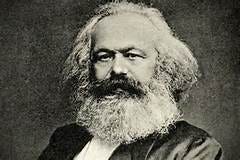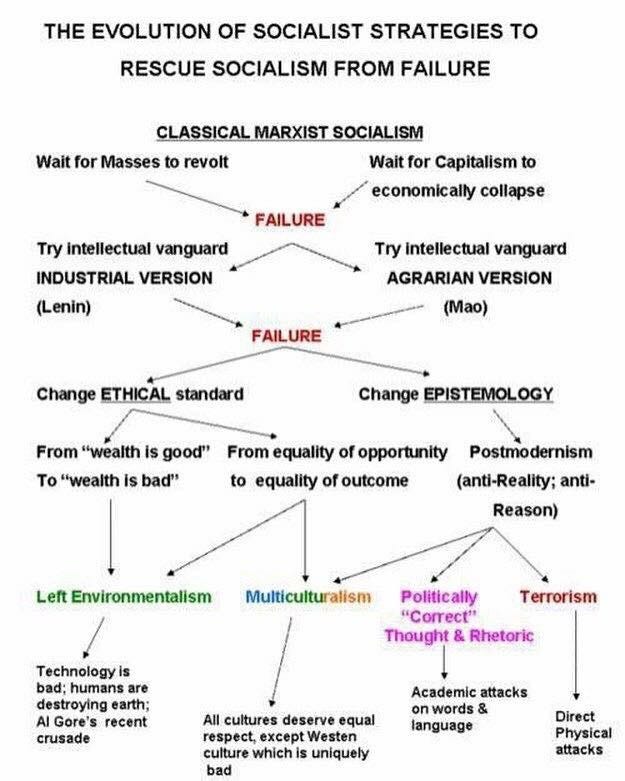Cultural Marxism: The origins of the present day social justice movement, and political correctness.
https://thepolicy.us/cultural-marxism-the-origins-of-the-present-day-social-justice-movement-and-political-correctness-ffb89c6ef4f1
----------------------------------------------------------------------------------------------------------
Cultural Marxism: The origins of the present day social justice movement, and political correctness.

Those who have engaged me and others in political discourse may have heard one of us bring up “Cultural Marxism”, but not provide a clear explanation as to what it is and where it comes from. I’m writing this essay to serve that purpose.
“What is Cultural Marxism? Where does it come from?”
Cultural Marxism as I’m sure one can infer from its name, was born out of the economic theory as developed by Karl Marx.
For those who need a brushing up; Marx believed that feudalism would lead to capitalism. Capitalism would create massive inequality between the rich and the poor. The workers would all rise up, and overthrow the hated “bourgeoisie” (the upper class). There would then be a “dictatorship of the proletariat” (the workers) which would ensure equality. Then that government would wear away and break down, and the world would be left with this utopian, egalitarian society. (Although, how and why government would break down and equality would be ensured was never clearly explained.)
Marx believed that this “workers’ uprising” would occur during a massive war. When World War 1 broke out, many Marxists were hoping that their time had come.
Clearly, it did not. The workers in the various Western countries all rallied behind their nations’ flags and fought each other. The only example of a communist uprising during this time was in Russia, and it took tremendous effort to make it happen. (The Russian government was bribed by the United States to continue fighting in the war on the Allied side, ensuring that it was too weak to put down any potential revolt when it happened. Vladimir Lenin was sent by Germany from his exile there in order to spread unrest in Russia, and it took him multiple attempts before successfully seizing power.)
“So why didn’t Marx’s theory work out as planned?”
There are numerous theories for this.
For one, the rise in the average person’s standard of living greatly rose in the late nineteenth and early twentieth centuries, despite the general misconception today. It’s true that relative to today things were pretty lousy, but if you look at the era that came before, there were significant improvements. Hours worked decreased, infant mortality decreased, calories consumed by worker increased, wages relative to prices rose, and goods that were considered luxuries before, were now becoming available to the average person.
What we would call “the middle class” today was emerging, and it was no longer just the dichotomy of“the rich” vs “the poor”. With a way out of dire poverty now becoming available, there was fewer reasons to resent one’s lot in life.
However, the two thinkers Antonio Gramsci of Italy, and Georg Lukacs of Hungary took a much different view.


Lukacs and Gramsci both argued that the reason that the Marxist class theory didn’t play out was because Western values were too deeply entrenched, notably the emphasis on the individual over the collective, and Christianity. These had to be destroyed in order for the communist utopia to be achieved.
In 1919, Lukacs was declared the “Minister of Culture” in the short lived Hungarian Soviet Republic. As someone in charge of education, he introduced some of the first sex education classes, designed to undermine the traditional sexual views of the West which he believed was a step closer to accomplishing his goal.
The Hungarian Soviet Republic collapsed shortly thereafter, and Lukacs fled to Vienna, Austria where he befriended other Marxists, including Antonio Gramsci.
Gramsci returned to Italy, where he was imprisoned by Benito Mussolini in 1926, as communism was considered a primary ideological enemy of the fascist regime. Gramsci worked on his “prison notebooks”, which outlined his chief insight which is called “cultural hegemony”.
Cultural hegemony stated the various factors that made Western civilization what it was, and was thus preventing the communist revolution. The key was to continue the “class war” but at the same, undermine these factors from within. These factors were:
- Christianity
- Authority
- Sexual restraint
- Personal responsibility
- Heredity
- Law
- Truth
- Family
- Patriotism and national unity
- Community
- Conservatism
- Language
- Tradition
Gramsci believed that the media and academia had to issue a “counter-hegemony” message, which would help undermine these planks of Western culture.
Now as a brief mental exercise, think about these things I’m listing, and about how much criticism they have faced in recent times by the media, academia, and popular culture.
The Frankfurt school
In 1923, a group of German Marxists influenced by Gramsci and Lukacs as well as the the psychoanalyst Sigmund Freud and the sociologist Max Weber, opened a think tank at Frankfurt University called “The Institute for Social Research”. This would become simply known as “The Frankfurt School”.
The main thinkers here were Max Horkheimer, Theodor Adorno, Wilhelm Reich, Herbert Marcuse, and Erich Fromm. These men (like Gramsci and Lukacs) generally agreed with Marx, but believed that he greatly underestimated the power of culture. They realized that many of “the workers” were now rising into the middle class, so they had no incentive to overthrow the system.
When Hitler rose to power in 1933, these thinkers fled to the United States seeing as how as with Italian fascism, Nazism viewed Marxism as a primary enemy. These intellectuals arrived in New York City, taking up positions at Columbia University. The Frankfurt School was loosely reestablished at Columbia, this time focusing on American society, rather than German.
Critical Theory
In 1937, Horkheimer wrote about what is today known as “critical theory”.
Critical theory is a social theory which is about criticizing the way a culture and “society as a whole” function, in order to change it.
Contrast this with other social theories, which are more just about understanding and interpreting why things are as they are.
“So where does political correctness fit into all of this?”
Largely due to the influence of Gramsci, in the 1930’s the communist leadership in Russia joked about how what they wanted people to believe in order to control them didn’t naturally correspond with reality. Things that weren’t to the Party’s liking weren’t factually correct, but were indeed “politically correct”.
In order to try and achieve this, the Party started policing the language. Hence why you couldn’t criticize the Soviet state, or question the system.
Contrary to popular sentiment, political correctness was never about “saying something nice”. It was about controlling discourse in order to shape culture from day one.
Just look at the words: “politically” followed by “correct”.
Correct according to whose politics?
The Frankfurt School after the war
After Hitler was defeated, many members of the school went back to Frankfurt, Germany to reestablish it. (Unfortunately) Herbert Marcuse stayed in the United States.
In the 1950’s, Marcuse stated the Marxist revolution would not be brought about by “the proletariat” but by a coalition of blacks, feminist women, homosexuals, and students. This is where the term “Cultural Marxism” comes from, as it is applied to marginalized groups rather than class.
Marcuse gained much popularity with students during the 1960’s due the Vietnam War and draft, speaking at protests and writing books that swayed popular opinion. He became “The Father of the New Left” in the United States.
Marcuse was one of the main thinkers to redefine the concept of “tolerance”, notably the view that most left wing ideologies should be embraced because they’re “tolerant”, and most right wing ideologies should be suppressed for the opposite reason. He advocated “undemocratic means”, if this can’t be achieved through the ballot box. (Does this sound familiar at all?)
Cultural Marxism post Marcuse
Marcuse later returned to Germany and died in 1979, but the students he influenced in the 1960’s went on to teach in academia. They carried on his philosophy, but developed it further.. becoming more and more extreme over time.
For example, Marcuse said “discrimination on the grounds of race should not be tolerated”.. A view I think that most rational people on either side of the aisle hold today.
However, over time this became a call for affirmative action, demand for equal outcome (as opposed to equal opportunity), calls for reparations, and so on. To certain people, even citing statistical information regarding specific races is deemed “hate speech”. This is reflective of the egalitarian goals of Marxism.
The same thing happened with feminism, which is why we see things like “manspreading”, “mansplaining”, and the myth about “women earn $0.77 for every $1.00 a man earns!” repeated ad infinitum, despite evidence to the contrary.
Marcuse is also believed to be at least partially responsible for starting the whole “self esteem for doing nothing” mindset. He once said “everyone is an individual deserving of love”.
… Which I actually think is pretty fair, but unfortunately over time this became “everyone is a winner”, “everyone is special”, “everyone is entitled to (x)” and so on. That’s why many people of recent generations have grown up so insecure and narcissistic, because they were told that they were special regardless of what they did, were given trophies and medal for participating, and their grades were raised just because their parents got on the teachers about them. These kids then became adults and got out into the real world, and learned very quickly that they weren’t as special and as entitled as they thought.
Which has usually been met with the reaction along the lines of:
“No, I am special! I deserve (x)! Stop oppressing me!” (Sound familiar?)

“So where does that leave us today? Is there a Marxist conspiracy to overthrow Western society?”
I highly doubt it. There are those that think that there are boogeymen behind the scenes orchestrating these events, but I think a number of influential people just spread bad ideas which festered and became more and more extreme over time. I do think that many have taken advantage of this though, mainly by appealing to the greed, narcissism, and sense of entitlement that many in recent generations have in order to sell them things, get votes, and control them. These ideas have appealed to a disgruntled (sometimes justified, sometimes not) population that has longed for egalitarianism, which I believe is largely unattainable.
I believe that intelligence, looks, athletic ability, work ethic, and most other things operate on a bell curve, with most people in different spots on each bell curve. Some are terrible, most are average, and some are exceptional at most things.

No overly coercive government, law, or policing of language can change all of that.
It is my hope that we can work together to bring each other up, rather than pull those we resent down.
Thank you very much for reading! — STK
Sources:
Fairly long, but excellent essay explaining the history of political correctness. Best source that I have seen thus far on the subject:
Herbert Marcuse’s essay “Repressive Tolerance”:
Peer reviewed resource on the subject:




